What Is Canine Distemper?
If you have comments or additional information please leave them in the comments section, I do read them all!!
Good Morning!
My Dog Luke got bit by rattlesnake while there i asked vets to make sure he had his shots they were then past due by a few months i put trust in them they did it well no i got Luke home from a week stay at vet from snake bite he regressed not even 2 days being home.
Took him back in they said he had distemper he needed be put down…n now they said.
I refused something told me that this dog can survive and i was going take all measures to make sure he does.
3 more visits to vet on our last options he has gone from a 87 lbs American bulldog pure muscle n strong to a frail 40 lbs maybe..
I thought id have to have him go to heaven see pops but i seen ur post. I got this yesterday n after one dose last nite he was not as wobbly and muscles seemed stronger sleeping alit still i want him to he takes every step i take poor gut but he’s used to going to work with me to shower to do everything.

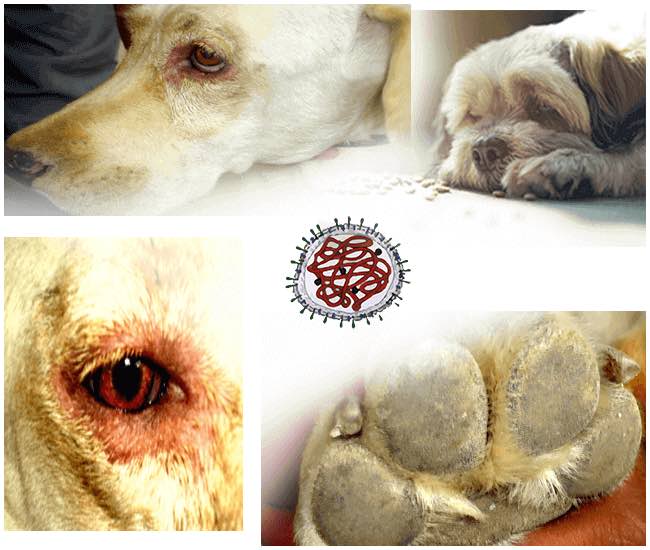
Can Humans catch Distemper from Dogs or other animals? {is CDV zoonotic?}
Distemper is a viral disease/infection that affects a whole host of species, such as dogs, wolves, coyotes and foxes. Despite being commonly called Canine Distemper, it also affects animals outwith the canine family, such as raccoons, wild cats, ferrets, pandas, skunks and many more. Domesticated dogs have also been responsible for spreading this disease through wild populations and distemper has played a significant role in the extinction and endangerment of several wild species.
But don’t worry the canine distemper virus (CDV) cannot pass from animals to humans. So CDV is not a zoonotic disease.
reference:
Martinez-Gutierrez M, Ruiz-Saenz J. Diversity of susceptible hosts in canine distemper virus infection: a systematic review and data synthesis. BMC Veterinary Research. 2016;12:78. doi:10.1186/s12917-016-0702-z.
Distemper is a systemic infection, affecting the eyes, gastrointestinal system, brain function, respiratory system and central nervous system (CNS). It’s highly infectious and, as a virus, has no cure. Around half of all cases are fatal, making it the most deadly canine virus after rabies worldwide.
A Dog suffering from Canine Distemper Virus (CDV)
Canine Distemper Virus (CDV)
Distemper is caused by a Paramyxoviridae virus called Canine Distemper Virus (CDV). The Paramyxoviridae family, more specifically, the Morbillivirus class. This includes viruses that are responsible for measles, mumps and bronchitis and is made up of negative-sense single stranded RNA. This means that when it enters the cell of its host, the viral RNA uses the host’s replication pathway (how we turn out DNA into proteins) to replicate itself. Negative-sense RNA is complementary to the mRNA needed to translate it into protein and since it’s already single stranded, the viral RNA doesn’t have to break apart to be transcribed. It simply inserts itself into the transcription pathway and sends copies of itself to the golgi apparatus where proteins are synthesised and excreted into our bodies.
CDV generally replicates in the respiratory tract lymphatic system before moving into the bloodstream after around 3 days. This causes a reduction of lymph nodes, resulting in immunosuppression. From there, it moves through the body to infect the gastrointestinal tract, urinary tract, eyes and central nervous system (CNS). Once in the CNS, and with no immune system to fight it off, the virus can cause inflammation in the brain, called encephalitis, and demyelination, which is the removal of myelin sheaths on the nerve cells. Without the myelin sheaths, nerve cells are not able to properly communicate with each other or other tissues, therefore you will see a reduction in mobility as they can’t communicate with muscles, sensation and cognitive function.
Signs Of Distemper

The incubation period for CDV is 14-18 days, so you won’t see symptoms straight away, other than perhaps a fever, which begins 3-7 days after infection. If you were to get a blood test done at this stage, the results would show a low white blood cell (WBC) count, especially the lymphocytes, and low platelets. This is a major sign that something is very wrong as the WBCs are responsible for immune responses. If your dog has a fever, it has an infection and its immune system should be hyperactive, showing high WBC counts, not low. The initial fever will only last for about 4 days before disappearing. By day 12 of infection, however, it will reappear and will last for at least a week.
Distemper Symptoms {what is it called the hard pad disease?}
The symptoms of distemper, like many viral infections, can be rather vague and difficult to diagnose as a particular disease. They include fever, which is seen in all infections; gastrointestinal issues like vomiting, diarrhea and loss of appetite; inflammation; discharge from the eyes and nose (Nose and eye discharge are called Ocular discharge) similar to the symptoms in Conjunctivitis; respiratory issues such as coughing and difficulty breathing; lethargy and footpads and noses becoming hard.
Because of this hardening of the footpads, which is non-reversible, the disease is often referred to as the hard pad disease. It’s always a good idea to check footpads when you groom your pup! Also use the appropriate dog clippers to keep the fur on feet and around feet, pads, and eyes to a minimum for quick and easy access for inspections (These are the places where ticks also like to hide!). We have several guides starting with clippers for general use and for specific breeds, clippers for matted fur or for thick hair etc or clippers for specific body sizes.
There is also often secondary bacterial infections due to the compromised immune system. These animal distemper symptoms make it difficult to diagnose as they are also the same symptoms of several other infections.
There will be an increase in sensitivity to almost all stimuli, such as light sensitivity and a hypersensitivity to touch, so that a gentle touch will cause pain where it never used to. These signs may start showing as easy as 10 days after infection or may be latent for several weeks. This depends on the immune system of the infected dog.
Can A Dog Survive Distemper?

Adult dogs who do survive canine distemper infections will often be left with long lasting, though non-life-threatening, issues. Most will retain a small twitch that should become less severe over time, but which will likely never go away. The hardening of the foot pads and nose is also non-reversible. Puppies who survive tend to have issues with their teeth as the virus kills the cells responsible for creating the enamel coating on new teeth. Any that have not yet formed an enamel coat or that have not yet made it through the gums will not produce the required protection and will crumble quickly, leaving the dog without teeth.
The high fatality rate and permanent canine distemper symptoms that last after the infection is cleared make distemper quite a dangerous infection for dogs of all ages.
Diagnosing Canine Distemper
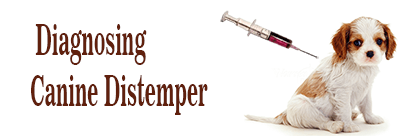
Many of the signs of distemper are very difficult to distinguish from other canine viral infections such as parvovirus and canine hepatitis. The main symptoms that will give away distemper are the hardening of the foot pads and the neurological signs.
Once at the vet, the best way to diagnose distemper and differentiate it from other viral infections is by finding the virus in the foot pads, eyes or bladder. This is done by taking some cells from these areas and staining them with a stain called Dif-Quick. Any distemper virus in the sample will stain a bright red colour to give a positive diagnosis.
Treatment for Canine Distemper
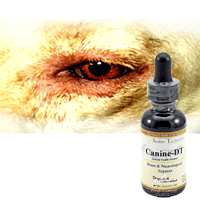
Because it’s a viral infection, there is no treatment for canine distemper. The nature of viruses is that they get into the host cells and then use the host mechanics to replicate. This means that there is nothing for the immune system or drugs to target. In bacterial infections, for example, we can target the proteins in the bacterial cell wall. These are called lipopolysaccharides (LPS) and are not made by anything other than bacteria. The immune system recognises them as foreign and we can target drugs to recognise them and destroy cells containing them. We can not do this with viruses without also targeting the same particles from the host cells, which would lead to all cells being destroyed and death of the host.
The only treatment for distemper is managing the symptoms and trying to prevent further damage. This involves giving painkillers, administering fluids and electrolytes to make sure the infected dog stays hydrated, giving anticonvulsants to stop seizures and broad spectrum antibiotics to avoid secondary infections. Giving antibiotics for distemper is not to treat distemper. Antibiotics have no effect on viral infections, which is why you should not be taking them for colds or flus. Due to the compromised immune system that occurs with a distemper infection, opportunistic bacteria jump on the chance to infect a susceptible host and you will often find pneumonia as presenting during a distemper infection. Although not caused by the distemper, it is because of the distemper that this happens.
Alternative Treatments for distemper – Please try these before you let them put your dog to sleep!
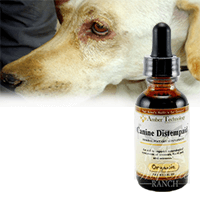
In humans, there have been many studies done on using Vitamin A to treat measles. Since the CDV is from the same family and is molecularly similar to the measles virus, this treatment was tested on CDV in ferrets. The study found that the ferrets who were given high doses of Vitamin A after infection with CDV produced only a mild rash in response to infection, as opposed to the control group. The control group were also infected with CDV, but were not given the high dose Vitamin A treatment and they developed much more severe symptoms, including conjunctivitis, fever, cough, rash and diarrhea. The mechanism that Vitamin A uses against the CDV is still unknown so more study needs to be done, but as a symptomatic treatment, high dose Vitamin A has shown to be quite effective.
Ribavirin is an antiviral drug that has shown some promising effects against CDV. It’s been shown to eliminate 50% of the viral DNA from infected cells, but this was tested on infected cell cultures rather than on an infected living host. There is a concern that once CDV crosses the blood-brain barrier and enters the CNS, ribavirin will not be able to follow it. It’s also quite a harsh drug and causes damage to the digestive tissue and may even result in leukemia.
Although dogs, unlike humans, make their own Vitamin C, they generally don’t get very much of it. It’s therefore important to make sure that it’s part of your dog’s diet. Vitamin C is hugely important in making sure that the immune system is working optimally. It’s most likely that the Vitamin C given to the dogs with distemper helps the immune system to fight off the viral infection and protect the host cells rather than interacting directly with the virus.
Canine Distemper Vaccine
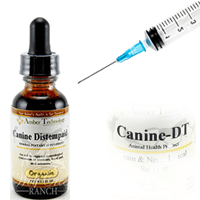
The distemper vaccine was first invented in 1923, but was not commercially developed for another 27 years. It is not widely used and obviously hasn’t been administered to wild populations so distemper is still a widespread issue for dog owners. Unvaccinated dogs can spread the virus in areas where many dogs interact, such as at dog parks or pet shelters.
The vaccine for canine distemper is an attenuated live vaccine, meaning that it contains the CDV, but a modified version that doesn’t cause disease. It’s also possible to get a modified version of the measles virus, whereby that virus has part of the CDV inserted into it to activate an immune response. Studies have shown that this recombinant vaccine actually produces a greater antibody response. Mostly likely this is because the measles vaccine and CDV are from the same family. It can be used as a booster vaccine and significantly increases antibody production in dogs previously vaccinated with the modified CDV.
Puppies should receive their vaccinations at around 6-8 weeks old. Distemper is one of the vaccines that your puppy should be getting, along with others like canine hepatitis, parvovirus and parainfluenza.These are often given as a combination vaccine, with several viruses all combined into one shot. This vaccine is most commonly referred to as DHPP, but there are other combinations with different acronyms available. Following that, distemper booster vaccines are needed every couple of weeks for the next 8 weeks. Without these booster, your puppy won’t get the full dosage of vaccine and it won’t be properly immunised. Any puppies get their first vaccines while still with their breeder as they’re not usually separated from the mother until they’re 10 weeks old. After this, many dog owners don’t bother keeping up with the boosters, leaving their dog susceptible to infection.
Some people wonder are distemper shots necessary for dogs and are we over vaccinating our pets? The same question is often asked in regards to vaccination shots for human babies too. While this is a question of some moral controversy, the science points to a simple “Yes”. Vaccines work. They prevent disease and in some cases have even eradicate diseased from populations, like smallpox in humans. Distemper is a serious infection that is just as likely to kill your dog as not and even if your dog survives, it could be permanently damaged. The risks of vaccines are so small that it’s almost negligible compared to the horrific suffering distemper will cause to your beloved pet. The distemper vaccine is essential to the health of your puppy once the immunity it receives from its mother fades away. While it’s not legally required in the USA, it’s highly recommended.
Can A Fully Vaccinated Dog Get Distemper?
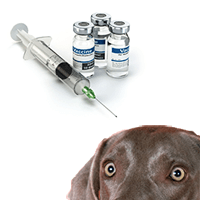
This question may seem like a straightforward yes or no type question, but there is a little more to it than that. When you receive a vaccination, your body is being exposed to a pathogen in order to create an immune response. This is called the primary response as it’s the first time your immune system has seen this pathogen. The point of a booster is so that you then create a secondary response. After your body is exposed to a pathogen, it creates a host of immune cells to fight that pathogen off. These are cells such as macrophages that ingest the pathogen and infected cells, break them down and absorb or dispose of the components; T-cells that produce chemicals to cause inflammation and cell death to protect you from further infection and B-cells that produce antibodies that recognise the foreign particles and alert your body to their presence. Each antibody is unique to a particular part of a pathogen, called an antigen. Then, once your immune system had gotten rid of the infection, some of these B-cells are stored away in a library of all the antigens you’ve ever been exposed to.
If you ever come into contact with an antigen that you’ve previously had contact with, your body doesn’t have to make antibodies to it from scratch. The B-cells recognise it quickly, inform the immune system that it’s back and the correct response is produces much faster than the first time round. This means that the infection is cleared out of your system much quicker than before and you may have few, less severe of no symptoms from the secondary infection. A tertiary infection is then dealt with even more efficiently.
The other reason that a dog may present with distemper after being fully vaccinated is that it already had the virus before it got the vaccine. If you get a rescue dog from a shelter, there is a huge probability that it’s been exposed to CDV. As a responsible dog owner, you would immediately get your new dog vaccinated, but it may already be too late. As you know now, the symptoms don’t present until more than a week after infection so it could have been there from before you brought your new dog home. In this case, the vaccine has come too late and won’t do an awful lot of good. This is also the main way that a puppy can get distemper after being vaccinated.
Although it’s incredibly rare, it is also possible for a dog or puppy to contract distemper from the vaccine. However, most vets who have been treating dogs for several decades have never seen this happen. Theoretically, it is possible, but the chances of it happening are minimal.
Can a dog can get distemper twice?
Should I vaccinate my dog after she has recovered from Distemper [CDV Virus]
My 3 year old German shepherd mix suffered from canine distemper. Her symptoms were very bad, she got tremors in her head and twitches and couldn’t get up for a week. My vet told me there was a 50% chance of survival. I decided to try and treat her and she’s doing so much better now (aside from hearing loss). I’m so happy I took the risk. I just have one question. Should I vaccinate my dog after she has recovered
Here is the answer/s from our Doctor of Veterinary Medicine
- Well, recovering from a disease is the most powerful vaccination she can ever get. But remember that she is immunized only against CDV.
- Standard vaccines are polyvalent. They protect against multiple viruses. So, it is recommended to stick to the standard vaccination schedule to get her protected against other opportunistic pathogens.
- Why we repeat vaccination: vaccination’s goal is the production of antibodies. With time, antibodies level decease in the organism and we should boost it through revaccination every year just like humans.
Where To Buy Distemper Vaccine
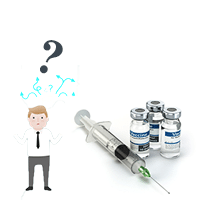
Of course, you can buy distemper vaccine from your vet directly. He can also administer the vaccine and boosters for you, but if you prefer to vaccinate your dog at home, you can also buy distemper vaccine online as part of the combination vaccine. Many sites will also supply you with syringes, sterile needles and all accessories you need to do this. Obviously, the price of the vaccine will vary from site to site, but the average cost of distemper vaccine seems to be around $80 when you buy it as part of the combination virus. Depending on what you get and where, you can spend a couple of hundred dollars on your puppies vaccines. Please also make sure that you research the site that you’re buying from and make sure the vaccine is effective, sterile and going to be transported properly. This particular vaccine needs to be refrigerated at all times or else the viruses will die and you won’t get the proper immune response from it to provide the protection you paid for.
Distemper In Humans
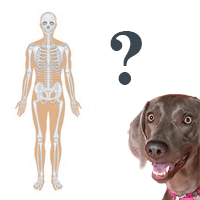
Since distemper is so closely related to the measles virus, many scientists think that it’s actually a mutated form of measles that altered its genome in order to infect a new set of hosts. Because of this incredible similarity, it is possible for it to replicate in human cells. However, it does not become symptomatic so you will not get sick by picking up distemper from your dog. So distemper is not a zoonotic disease. A human’s resistance to canine distemper could be, in part, from the measles vaccines that we get as children. Studies have found that the same antibody response is produced in the presence of measles in humans and canine distemper in rabbits. However, it is most likely that the virus has mutated just enough that it no longer produces symptoms in humans as our immune system is able to suppress it quickly.
Disinfect dog bowls and feeding areas as the virus is spread through saliva and can pass through contaminated food and water. Change the water frequently to get rid of any virus particles that may be swimming in there.
Also disinfect any toys that your dog picks up with its mouth or tends to chew on. Keeping the environment really clean is the best way to keep the virus as contained as you can. However, this will not stop it spreading as it’s transmitted through the air so you do still need to vaccinate all of your pets.


References
Khoo C, Cunnick J, Friesen K, Gross KL, Wedekind K, Jewell DE. The role of supplementary dietary antioxidants on immune response in puppies. Vet Ther. 2005;6(1):43–56.
Jalil Benyacoub, Gail L. Czarnecki-Maulden, Christoph Cavadini, Thérèse Sauthier, Rachel E. Anderson, Eduardo J. Schiffrin, Thierry von der Weid; Supplementation of Food with Enterococcus faecium (SF68) Stimulates Immune Functions in Young Dogs, The Journal of Nutrition, Volume 133, Issue 4, 1 April 2003, Pages 1158–1162, https://doi.org/10.1093/jn/133.4.1158
Satyaraj, E., Reynolds, A., Pelker, R., Labuda, J., Zhang, P., & Sun, P. (2013). Supplementation of diets with bovine colostrum influences immune function in dogs. British Journal of Nutrition, 110(12), 2216-2221. doi:10.1017/S000711451300175X




